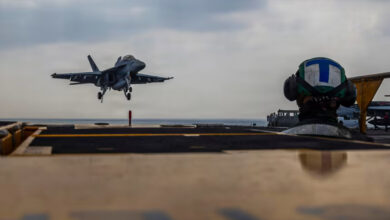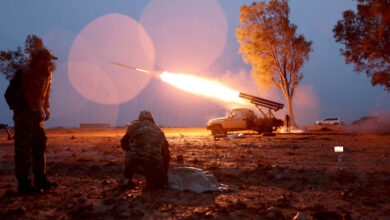
The name of Sinai’s Mount Halal returned to the media this week amid the armed forces’ reports about strikes against militant groups following last week’s attack on a military checkpoint that killed 16 security officers and injured seven.
Amid conflicting media reports, eyewitness accounts have indicated there were no actual strikes taking place in the mountain so far, but that there is an expectation for a takeover in the next few days.
Mount Halal stretches from Fallujah near the Suez Canal in the south to the north of the city of Arish, and from Central Sinai to the depths of the Negev Desert in Israel. It is considered a strategic mountain near the Egyptian border with Israel.
Filled with caves that are located at a height of 150 meters along 260 square kilometers, the mountain is an extension of the peaks of Al-Hasana, Al-Qosayma, Sadr al-Hitan, Al-Gifgafa and Al-Gady.
It contains routes known only to the Bedouins who inhabit this area, from the Tayaha tribe, the Nakhawla tribe and part of the Tarabin tribe. That is why the mountain became a critical resistance spot against Israeli forces after Egypt’s defeat in the 1967 War.
Hiding in the mountain are some 3,000 fugitives and members of militant groups fleeing sentences in absentia, according to tribesmen. They have been constituting a target for the security forces, but what makes it difficult to arrest them is the strong connection they have to tribesmen who supply them with information ahead of attempted crackdowns so that they move away from the mountain, using four-wheel-drive vehicles.
After the Taba and Sharm el-Sheikh terrorist bombings in 2004 and 2005, the Interior Ministry launched a major offensive on the mountain, with a thousand soldiers equipped with armored vehicles and helicopters. Yet the minefields around the mountain, which date back to the Israeli occupation and which the ministry claimed were planted by Bedouins, helped foil the attack that had lasted for several months, in which two policemen died and three armored vehicles were destroyed, all without directly clashing with the fugitives.
But the ministry claimed victory in the media, as its dissolved State Security service said it managed to poison Salem Shenwa — a wanted fugitive at the time — bring him dead from Suez to Mount Halal, shoot him again there and take a picture of him dead.
Sources say any attempt to penetrate that area is bound to fail if not prearranged with the tribes. This is why the place is a secure haven for criminals.
This piece was originally published in Egypt Independent's weekly print edition.




